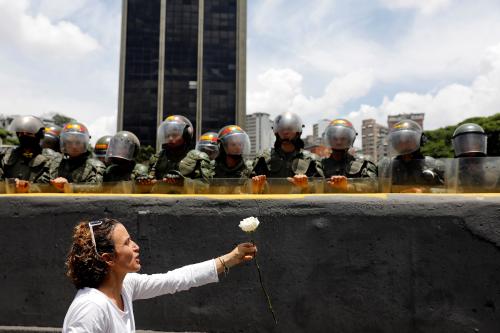

10:00 am EDT - 11:30 am EDT
Past Event
10:00 am - 11:30 am EDT
1775 Massachusetts Avenue N.W.
Washington, DC
20036
Due to their more open and deliberative nature, democracies are perceived as more vulnerable to conflict and violence. Even in established democracies, the role of democracy itself in underpinning national security and international stability is in doubt.
In June 2016, the Community of Democracies, an international forum dedicated to common action among democracies, launched the Democracy and Security Dialogue to foster greater collaboration among democracies to improve security outcomes and create a better environment for strengthening democracy around the world. Former Prime Minister of Tunisia Mehdi Jomaa, and former U.S. Secretary of State Madeleine Albright co-chaired the initiative, which was designed to combine top-quality research on democracy and security with a participatory consultation process.
On September 13, as governments gathered in Washington for the 9th ministerial conference of the Community of Democracies, Foreign Policy at Brookings hosted Secretary Albright and Prime Minister Jomaa to launch the Dialogue’s final report. The co-chairs were joined by the two principal researchers for the report—Cheryl Frank, head of Transnational Threats and International Crime Programme for the Institute for Security Studies, and Ted Piccone, senior fellow in the Foreign Policy program at Brookings—for a discussion of the findings and what they tell us about the links between democracy and security.
Brookings President Strobe Talbott provided introductory remarks.
Related Content

September 5, 2017



Suzanne Maloney, Itamar Rabinovich, Mara Karlin, Vanda Felbab-Brown, Stephanie T. Williams, Sharan Grewal, Steven Heydemann, Dafna H. Rand, Aslı Aydıntaşbaş, Kemal Kirişci, Hady Amr, Constanze Stelzenmüller, Pavel K. Baev, Steven Pifer, Ryan Hass, Tanvi Madan, Lynn Kuok, Michael E. O’Hanlon, Caitlin Talmadge, Joshua Rovner, Samantha Gross, William A. Galston, Scott R. Anderson +18 more
March 3, 2026

Jeffrey Feltman
March 2, 2026
2026
The Brookings Institution, Washington DC
Thursday, 10:00 am - 12:00 pm EDT